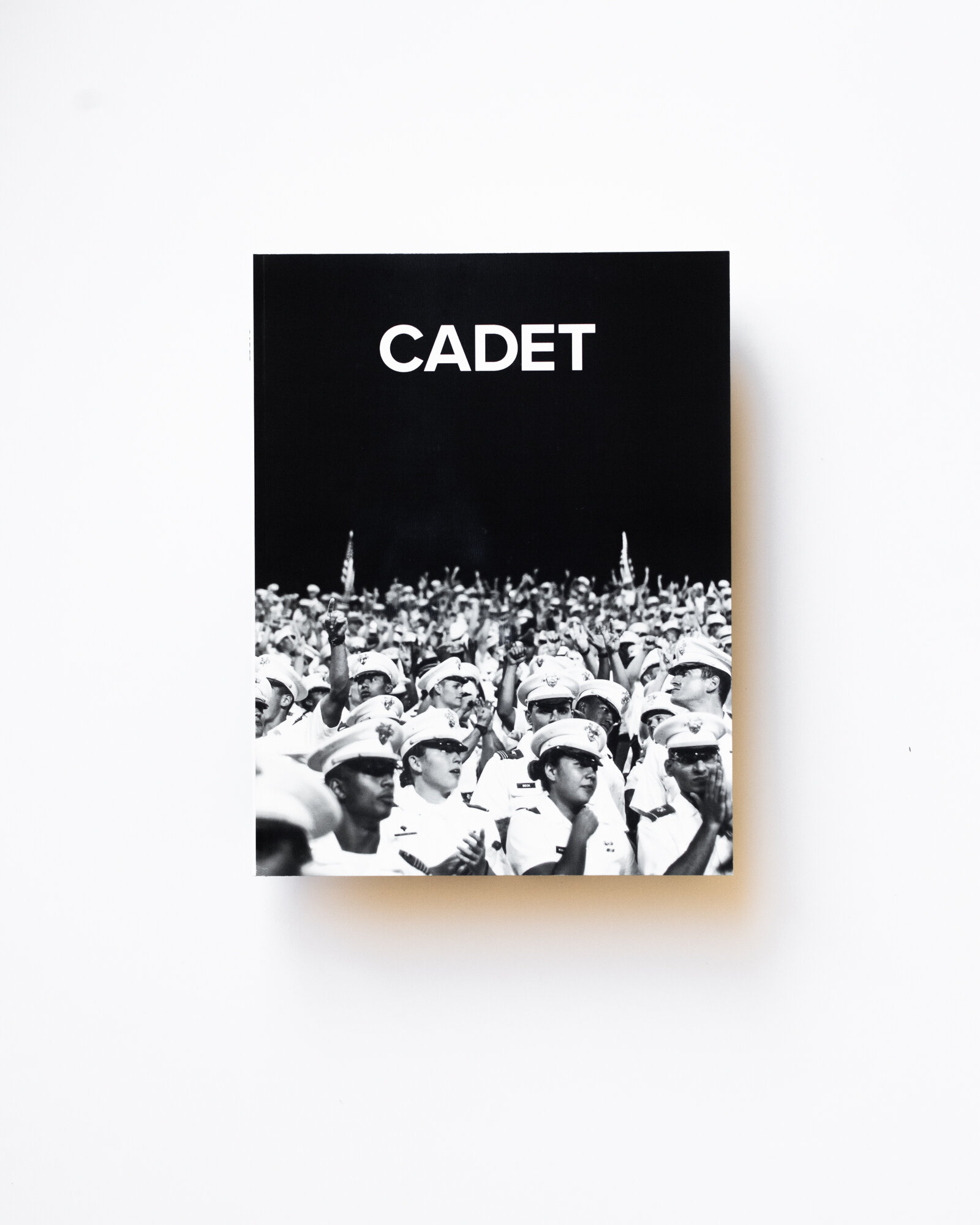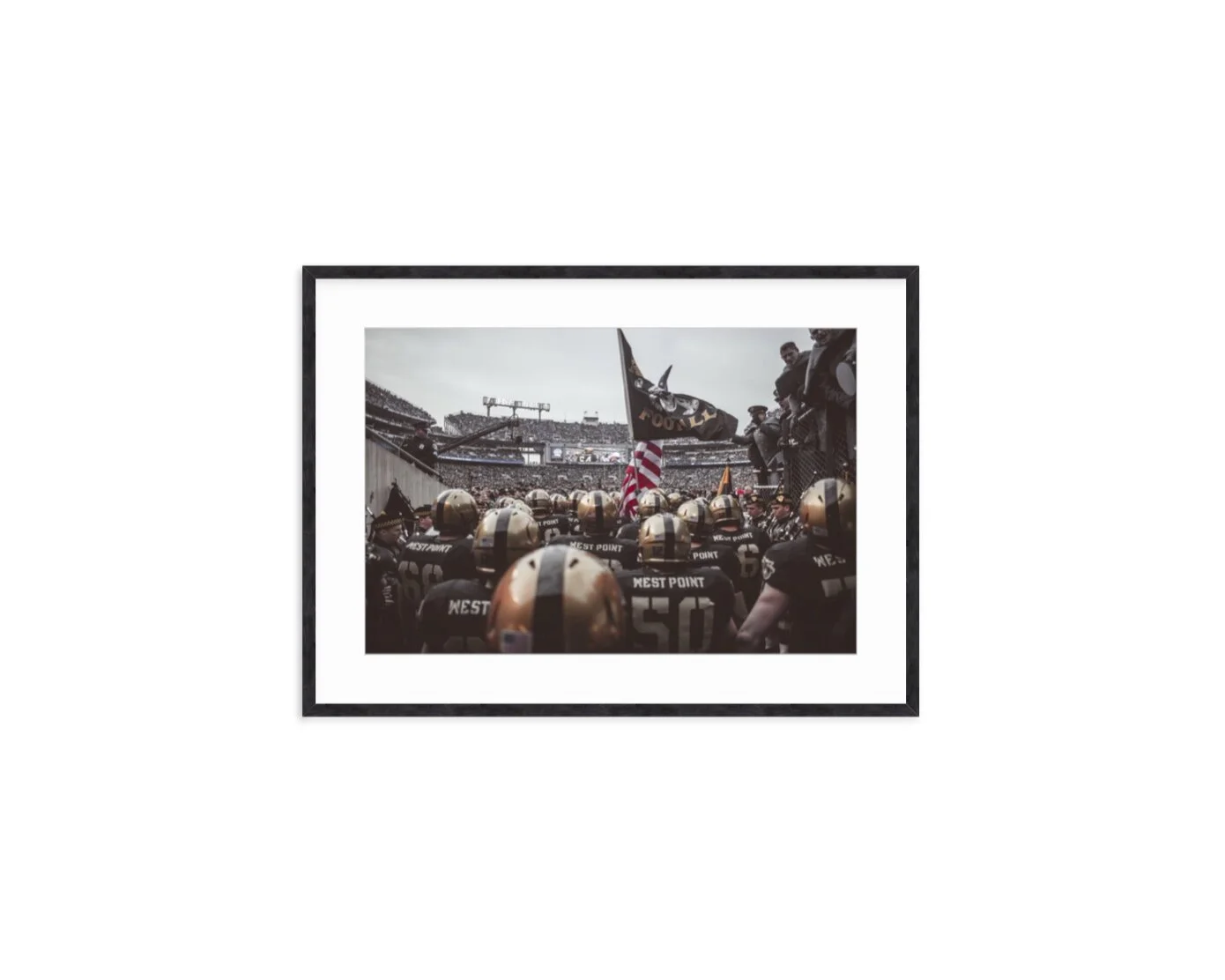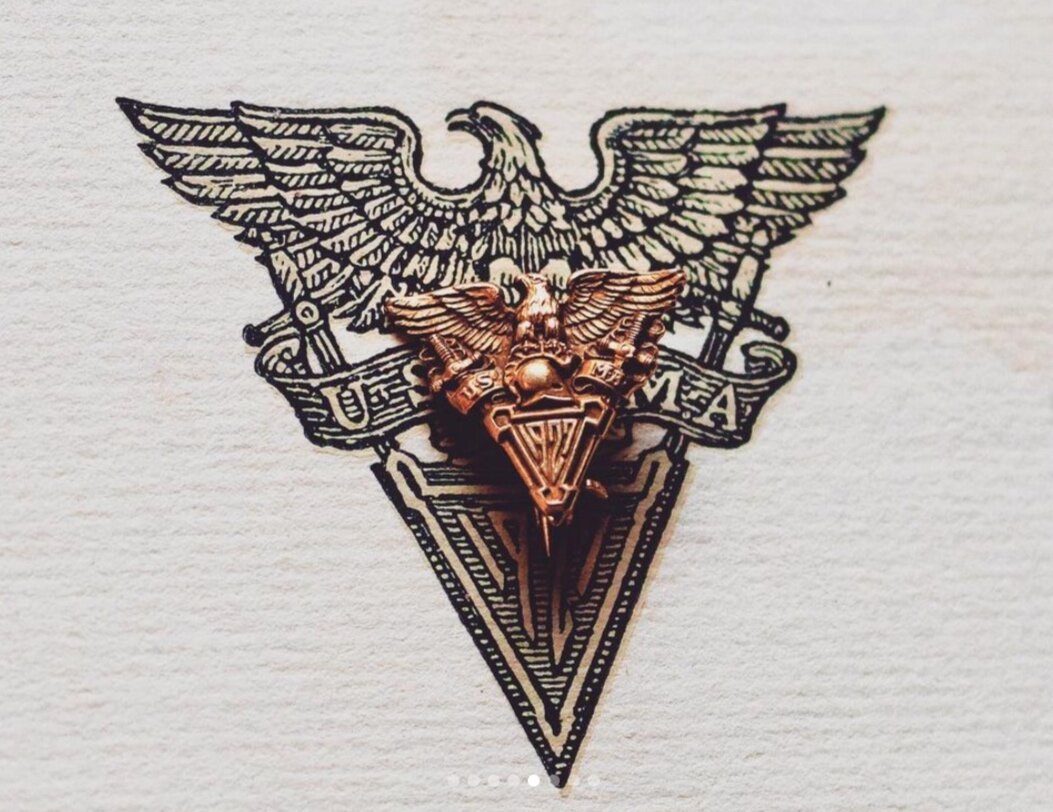WEST POINT 100 | MIKE NEMETH | USMA 2004
West Point 100: Creators
MIKE NEMETH USMA ‘04
Welcome to the “West Point 100: Creators” project. This effort is both a creative project and an insightful ethnography - curating a collection of 100 West Point creators.
This endeavor will ask the basic question: What do West Pointers create? And why?
In this Q&A we will explore with West Point creators the topic of creativity and the impact West Point had on their ability to think critically about the world around them and their place within the construct of the American Dream.
Chances are, if you’ve heard through the grapevine of SOME meticulously planned, flawlessly executed, and smashingly hilarious prank on the Naval Academy, it was the brainchild of Mike Nemeth (‘04). Mike is the Oz-like orchestrator behind Amazon’s #1 bestselling book on the Naval Academy (spoiler: it’s entirely blank), the faux news release FROM THE City of Annapolis celebrating “Go Army Beat Navy Day” (Yahoo! News picked it up) and the legendary “Barracks Linebacker” video (which yes, WENT WEST POINT VIRAL before YouTube EVER existed). In this interview, Mike shares that he’s got more tricks up his sleeve than HIS aptly timed Center Stall AND ACADEMY CASUAL humor (like covetable custom Gym-A shirts, Dress Gray hoodies and tailgate flags).
PART I - THE BASICS
In the simplest of terms, what do you create?
Smiles. In all that I do, I try to produce products and experiences that make life more enjoyable.
What do you think about when you’re alone in your car?
Long road trips are where I get in some really productive creative brainstorming. I’ve done solo trips from Ohio all across the country and will often work on an idea from start to finish - thinking about the entire arc of the project - only to then conclude that it’s a terrible idea! Many Army Navy pranks have been created and then cancelled in the course of a road trip.
What do you collect, and why?
I collect early 1800’s West Point documents - I started finding them in rare book shops and online - I have a decent collection - including an early roster of cadets and graduates with Thayer and Edgar Allen Poe, a list of discipline issues from the 1820s, and 1830s complaints to Congress about why they should shut down the institution. I majored in history and personally get a lot of satisfaction out of securing the documents and knowing that I’ll get to share them with people who appreciate and care about them.
What’s one thing you own that you should throw out but probably never will?
This is a serious problem for me. Not quite A&E hoarder level... but I do have the irrational ‘but I might need this one day’ thought way too often. I can’t get rid of books - I know there’s a bunch I should donate - but I literally have every book I’ve ever owned in a growing library in my house. Shelved and on display - if anyone needs a copy of their plebe year Discrete Dynamical Systems textbook, I’ve got one.
If you could only keep five possessions, what would they be?
Is this an old grad version of 3 knick-knacks visible on your desk? Aside from the family/home essentials, the five bonus fun items I would keep:
1. My ‘97 Jeep Cherokee.
2. My original copy of the first expense report from West Point.
3. My issued set of Gym-A.
4. My MacBook.
5. And a case of Red Bull
If you could witness event of the past, present, or future, what would it be?
Wow. wide open question! with some thought, I’ve concluded that I’d be there with Buzz and the rest of the crew for the first moon landing.
On my deathbed, I will wish that I had spent more TIME on
As I lay dying, I’ll think that I should have spent more time on West Point humor - just as I have once thought before as I lay dying - but that’s a story for another day.
On my deathbed, I will wish I had spent more MONEY on
On my deathbed - in 2084 - at Keller Army hospital - after boozing it up at the Firstie Club the night before my 80th reunion, I’ll wish I had donated more money back to the Cadet Activities Fund to eliminate cadet account deductions.
Let’s talk influences - Give us one musician, one book, one tv show, one movie, and one podcast that impacts your creative mindset. Feel free to expand and give us a little background on each.
Thinking about this one - I’d say that I consume TV & movies but don’t often think about it as an impact on my creative mindset. Those are escapes from the pressures of being creative!
Music is really important - I owe a big thanks to Ian Fleischmann - my classmate and companymate from C-3. Back in the ‘share drive’ era of computers, he sent me Robert Miles’ song Children - it might have been a midi file. I didn’t listen to a lot of ‘normal’ pop music growing up - mostly jazz and classical. I liked trance and early electronica because it had a similar length to it - 40-60 min sets instead of a series of separate songs. So when I get into creative modes, I depend on a long stretch of music.
As far as books and their impact on my creative mindset, biggest influence on me without question is the great MAD Magazine. I waited at the mailbox for those issues every month - layers of satire on every page. I’d dissect every joke and try to understand what made it work.
PART II - THE CREATIVE PROCESS
What ritual or habit is especially important to you?
Making time for fitness has been increasingly important to me - especially as I’ve gone off onto my own as an entrepreneur. I carve out time for the gym as if they were doctor’s appointments - schedule around them and get there early. I wasn’t healthy for a few years after I was medically separated from the Army and now that I’m able to be active again I appreciate my health all the more. Plus - sometimes workouts are like long car rides and I can come up with great ideas.
What is the best investment (money, time, relationship, education, etc) you made in getting to where you are today?
Networking with other alumni from West Point - regardless of the professional/work value. I have some truly great friendships that contribute a lot to my life that I can trace back to a completely cold email that just asked for coffee.
What tool or object could you not live without in your workday?
I get a lot of mileage out of my MacBook Air - I still like working on my creative projects on my laptop - I can’t imagine only working from a phone or a tablet.
What are you not?
I’m not nearly as skilled in graphic design or photography as I would like. I depend on a small army of contractors and they do great work for me that is often misinterpreted as my own. My Photoshop skills peaked in 2003.
What do you do to get into a state of flow or your creative zone?
Find a place where I can play my electronica (old Daft Punk, Justice, & Avicii) without headphones. Close out all browser windows, hide my phone, and get some Red Bull. This usually takes place between 11PM and 3AM.
What is your biggest roadblock in your creative process?
Blinking cursors. My biggest roadblocks are starting and finishing! I have so many ideas/projects that it’s difficult for me to pick one, set aside the time, and begin. And then the perfectionist takes over and I won’t stop and finish because it’s never good enough.
Name one company or person you’re itching to work with.
The Rock. Just think of the Army Navy spirit opportunities.
PART III - WEST POINT
Talk about a West Point connection that was meaningful or unexpected.
I think this is a perfect opportunity for me to recognize some people that are really important to me. For context, I was medically separated as a 2LT and kicked to the curb just a few months after graduation. I went to NYC with no plan, no friends, (and no money). There were alumni who went out of their way to help me get on my feet, find work, find friends and I wouldn’t have made it without them. I hesitate to thank them by name only because I fear that I’ll overlook someone, but know that if you bought me coffee (or a drink) in 2005 in NYC, then drop me a note because I’d love to return the favor. Thank you Andee Hidalgo, Rose Ott, Gerry O’Donnell, John Delaney, Andy Bang, Jon Nussbaum, Glenn Wittpenn, Myles Bartley, Kevin Sheehan, a USAFA grad Scott Fenstermaker, and everyone else. Thank you.
What has been your high point, thus far, with West Point and its community?
Oh man. I’m fortunate to say that I’ve had a few high points for sure - the Army Navy pranks (when successful) are obviously a lot of fun. However, I’d have to say that connecting with Randy Lee USMA ‘84 is still my favorite West Point story. He was a Pentagon speechwriter and reached out to me while I was a cadet and offered me the chance to write a few jokes for the guest speaker at my own graduation speech and class dinner speech in the Mess Hall. He then added in a special thanks by mentioning me in the speech. I have coins from General Petraeus and Chairman of the Joint Chiefs of Staff General Myers because of writing jokes. - Second Place was getting a permanent PMI card from General Shinsheki because he was a Center Stall fan. My TAC didn’t know what to do.
What aspect of your time at the academy affects your currents endeavors as a creator?
Two memorable experiences relative to my West Point creative adventures that still shape my current endeavors:
A leader giving you room to be creative: I’m certain that my life would have taken a different turn if it weren’t for Craig Whiteside USMA ‘91. With perspective now, I have an even greater respect for him giving me the freedom to be creative while a cadet. I know he went to bat for me all the way up to the Commandant to let me write, film, and publish whatever I wanted. So thanks Sir! I try to be that supportive for my employees at my company and I’ve worked in organizations that didn’t trust their people half as much as then CPT Whiteside did with me in 2001.
Another thank you goes to James Vizzard from the English Department - he was a William & Mary ROTC guy and my EN301 professor. By the time my Cow year came around, I never knew if my professors had seen Center Stall yet or not. Then CPT Vizzard asked to see me after class a few weeks into the semester. I distinctly remember “I’ve seen your work - I like it. But get a damn haircut. You look sloppy and it doesn’t reflect well on your ability to balance the fun stuff with what you’re here to do. You’ll be able to go much further if you put as much effort into everything else as you do your humor.” - he was right. Creative ‘stuff’ is an interesting hobby in today’s professional world. Your boss or co-workers don’t think twice about you if you say you binge-watched 12 hours of Netflix, but if you choose to spend your time on a creative project it can quickly draw the ‘I guess you have too much time on your hands’ criticism. The only way to fight that is to absolutely be kicking ass in your other work so there’s no room to question you ability.
What question(s) or favor would you ask of the greater West Point community?
Actively support the West Point entrepreneurs out there - connect with them, support them, spend your money with their companies - academy grads obviously have many of the valuable traits of successful entrepreneurs, but it’s not an easy journey for anyone.
In 6 words, describe being a cadet.
Counting
Down
The
Days
To
Graduation
In 6 words, describe being an Old Grad.
Striving
To
Live
Up
To
Expectations
ABOUT THE WEST POINT 100
This project is intended as a survey of the West Point community, done through the lens of creativity. Through this process we hope to discover how each creator embodies leadership lessons learned at the Academy, and how each are shaping culture and driving industry across town, region, country and globe.
You may recognize some names and faces, while others may be new to you. What’s common among them is that they are all leaders, innovators, and trendsetters; they are pathfinders and creatives; they are all members of the strongest brotherhood and sisterhood in the nation - The Long Gray Line.
Through this project, we will carve out, perhaps, the first ever visual snapshot of West Point culture by exploring the Long Gray Line’s creators and their creations. Individually, the images and words will introduce you to 100 Old Grads and cadets. Collectively, this compilation will tell a meaningful, interwoven story about an often under appreciated and overlooked skill set developed during the USMA 47-month journey: the creative process.
The ultimate end state is a coffee table book featuring the stories and works of all 100 creators. If you are a creator or know of one in the USMA community, please reach out and help us highlight the creations of the Long Gray Line.























